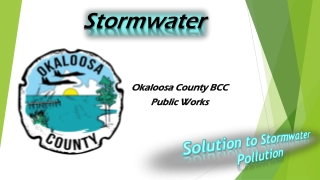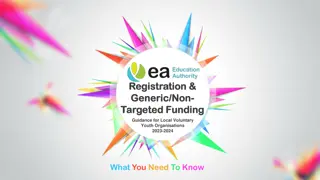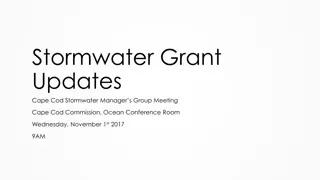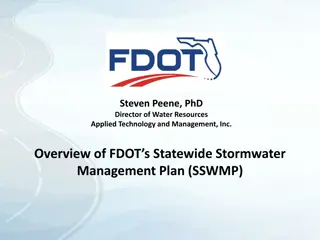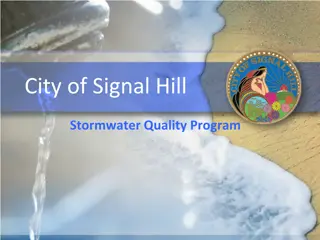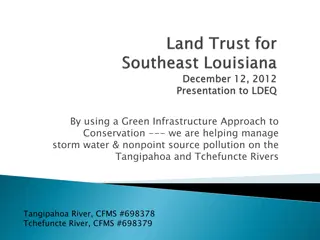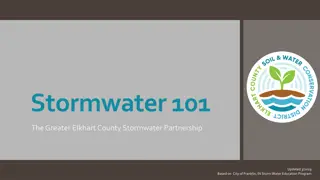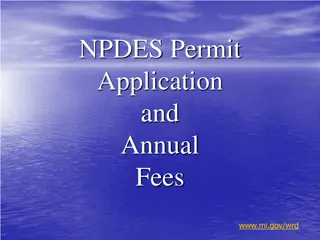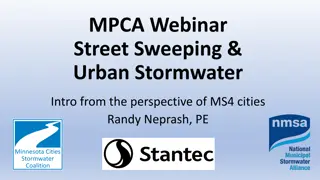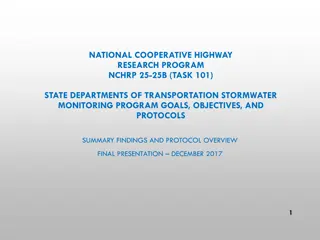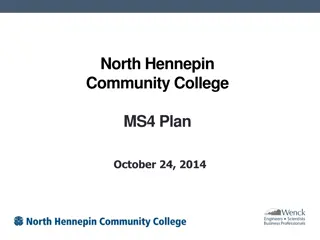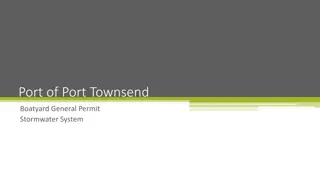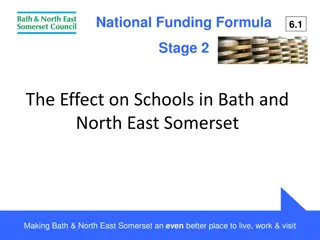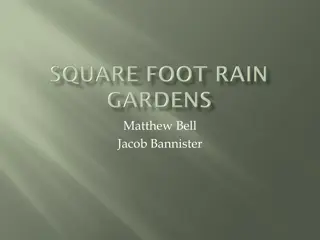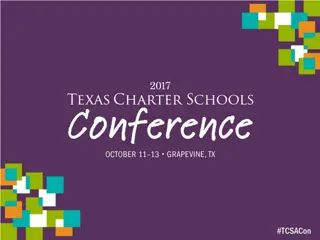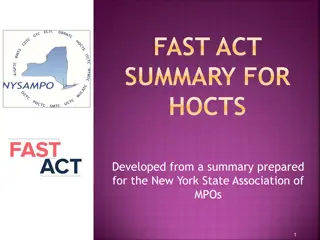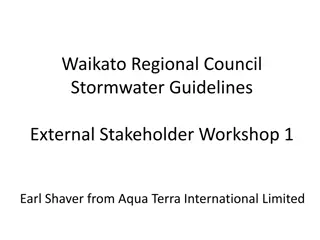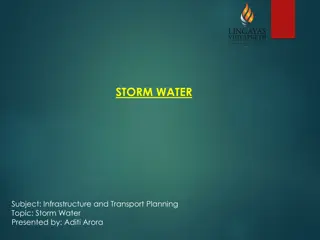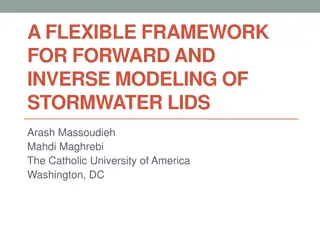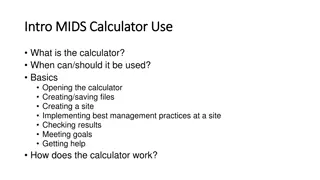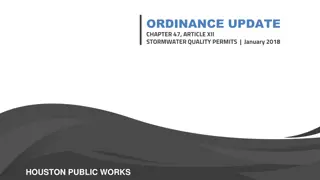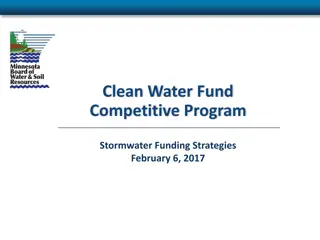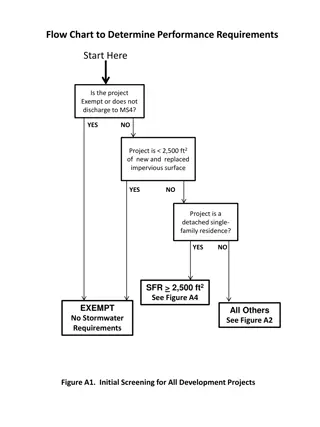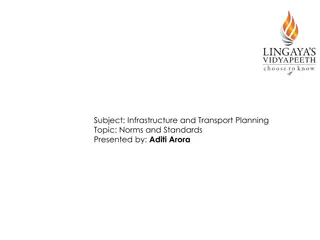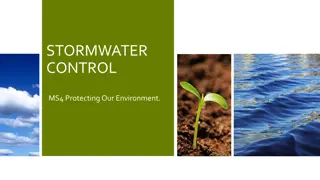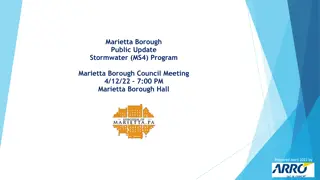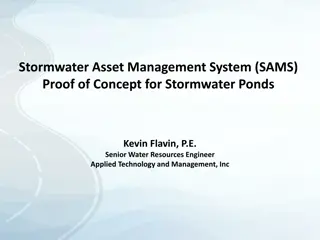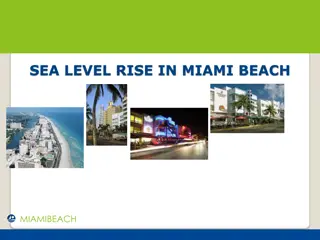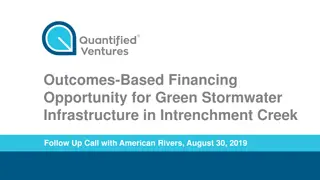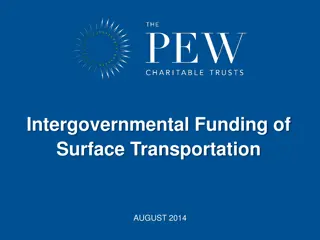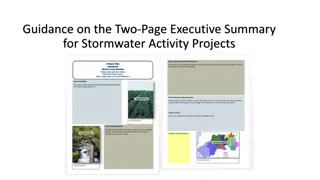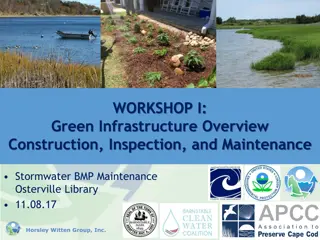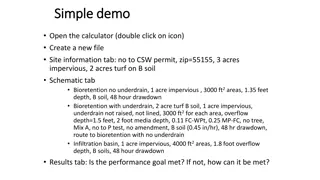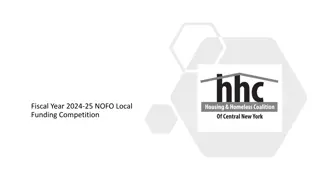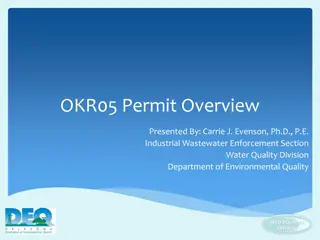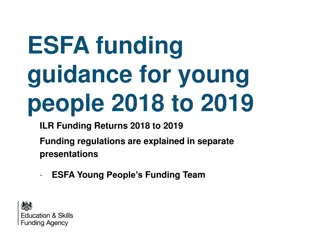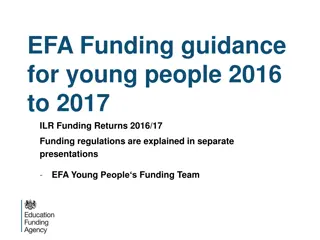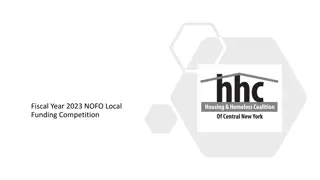Stormwater
Stormwater is excess water from rain/snow that can cause pollution if not managed properly. It can pick up pollutants and flow into water bodies, impacting the environment. Keeping stormwater clean involves individual actions like proper waste disposal, yard care, and car maintenance. Infrastructure
0 views • 10 slides
Guidance for Local Voluntary Youth Organisations Applying for Funding 2023-2024
Discover the steps and requirements for local voluntary youth organisations seeking funding in 2023-2024. Learn about generic/non-targeted funding, eligibility criteria, application stages, and funding utilization. Access the Education Authority's funding portal and navigate the registration and app
1 views • 24 slides
Cape Cod Stormwater Grant Updates & Municipal Assistance Program
This document provides comprehensive details on the Cape Cod Stormwater Grant Updates, DLTA MS4 Permit Compliance Assistance, and Municipal Assistance Program. It covers grant tasks, program components, GIS mapping assistance, Geospatial Tech Assistance, and various initiatives aimed at improving st
0 views • 19 slides
Understanding FDOT's Statewide Stormwater Management Plan (SSWMP)
The Statewide Stormwater Management Plan (SSWMP) is a crucial document developed by FDOT to reduce pollutant discharge in Phase 1 MS4s. It is required under Phase I MS4 permits by FDEP's NPDES program and falls under the Clean Water Act. The SSWMP applies primarily in 15 Phase I Permit Counties but
1 views • 13 slides
City of Signal Hill Stormwater Quality Program Overview
The City of Signal Hill, known for its unique geographic characteristics and historical oil production legacy, is proactive in implementing stormwater quality programs. The city addresses MS4 and TMDL requirements, demonstrating regional leadership in environmental initiatives. With a population of
1 views • 42 slides
Green Infrastructure Approach for Conservation of Tangipahoa and Tchefuncte Rivers
Using a green infrastructure approach, our organization is managing stormwater and nonpoint source pollution on the Tangipahoa and Tchefuncte Rivers in Southeast Louisiana. By conserving valuable natural areas and working with private landowners, we aim to create riparian buffers and enhance water q
1 views • 19 slides
Understanding the Greater Elkhart County Stormwater Partnership
The Greater Elkhart County Stormwater Partnership plays a vital role in managing stormwater in the region. Through initiatives such as the Municipal Separate Storm Sewer System (MS4) and Storm Water Quality Management Plans (SWQMP), they address key control measures to prevent pollution and ensure w
0 views • 18 slides
Understanding NPDES Permit Application and Fees in Michigan
NPDES permits in Michigan regulate the discharge of municipal, industrial, and commercial wastewater, as well as stormwater, into state surface waters under Act 451. The permit fees vary based on the type of discharge, with separate fees for stormwater and non-stormwater discharges. Industrial storm
1 views • 13 slides
Enhanced Street Sweeping for Effective Stormwater Management
Street sweeping plays a significant role in removing phosphorus and pollutants from urban environments. By implementing enhanced street sweeping programs based on tree canopy cover and phenology, cities can achieve cost-effective pollution reduction and meet TMDL WLAs. This approach can be integrate
0 views • 5 slides
State Transportation Department's Stormwater Monitoring Program Overview
This document presents findings and protocols from the National Cooperative Highway Research Program related to stormwater monitoring goals, objectives, and protocols for state departments of transportation. The project team, objectives, and report organization are outlined, aiming to provide guidan
0 views • 32 slides
Managing Urban Stormwater Runoff: North Hennepin Community College MS4 Plan
North Hennepin Community College is designated as an MS4 due to its location in an urban area, aiming to treat urban stormwater runoff and improve water quality. The MS4 Plan includes implementing six minimum control measures, such as public education, illicit discharge detection, and construction s
0 views • 10 slides
Port of Port Townsend Boatyard General Permit Stormwater System Chronology
The Port of Port Townsend Boatyard's stormwater system, regulated by general permits, has undergone upgrades and corrective actions over the years to address pollution issues, including zinc and copper exceedances. The recent focus has been on implementing advanced treatment measures to meet environ
0 views • 17 slides
Impact of National Funding Formula on Schools in Bath & North East Somerset
The National Funding Formula Stage 2 aims to enhance educational opportunities in Bath & North East Somerset. It addresses factors like per-pupil funding, English as an additional language, low prior attainment, deprivation, and additional needs. Allocations detail funding based on pupil categories
3 views • 9 slides
Implementing Rain Gardens for Sustainable Stormwater Management
Rain gardens offer an affordable and effective solution for homeowners to reduce stormwater runoff on their property. They provide numerous benefits such as filtering pollution, conserving water, and enhancing wildlife habitats. While installation may require some initial costs, maintenance is minim
0 views • 21 slides
Understanding School Finance: Key Funding Sources and Weighted Funding
Explore the differences in funding between charter schools and traditional ISDs, sources of funding in charter school systems, the impact of attendance on budget allocation, challenges in the Texas school finance system, and the future outlook for charter school funding amidst potential changes. Del
1 views • 90 slides
Overview of FAST Act for Transportation Planning
The FAST Act, passed in 2015, authorizes federal programs for transportation development with a focus on surface transportation. It extends funding through 2020, totaling $304.7 billion. The Act aims to enhance resiliency, reliability, and stormwater mitigation in transportation systems. Planning fa
2 views • 10 slides
Waikato Regional Council Stormwater Guidelines Workshop Overview
The Waikato Regional Council organized an external stakeholder workshop to discuss their new stormwater guidelines, aiming to provide consistent hydrologic design practices in the region. The workshop highlighted the importance of a council-specific guideline, changes from TP 108, allowance for alte
0 views • 20 slides
Managing Stormwater in Infrastructure & Transport Planning: A Comprehensive Overview
Stormwater management is crucial for urban areas like Delhi due to heavy rainfall patterns and the risk of flooding. Factors influencing rainfall, runoff estimation methods, and water stagnation points are discussed. The importance of natural drainage systems in mitigating flooding is emphasized.
0 views • 5 slides
Florida International University Student Government Association Graduate and Professional Student Committee (GPSC)
The Florida International University Student Government Association Graduate and Professional Student Committee (GPSC) in Spring 2016 aims to enhance the graduate student experience, promote quality research efforts, and provide educational workshops. The committee consists of Graduate Senators, a M
0 views • 29 slides
Flexible Framework for Stormwater Lids Modeling
A new flexible framework for forward and inverse modeling of stormwater lids is presented. It includes governing equations, hydraulic and contaminant transport, numerical methods, and demonstration cases for various green infrastructure components. The importance of different processes in modeling i
0 views • 20 slides
Understanding the MIDS Calculator for Stormwater Management
The MIDS Calculator is an Excel-based tool that helps quantify stormwater runoff volume reduction and pollutant removal for Best Management Practices (BMPs). It can assist in selecting and sizing BMPs to meet regulatory or water quality objectives. Despite some limitations, it is widely used and off
0 views • 14 slides
Stormwater Quality Permit Regulations in Houston Public Works - January 2018 Update
Houston's Stormwater Quality Permit regulations, based on the Clean Water Act, have evolved over the years, with updates in 2001, 2009, and more. The city's Chapter 47, Article XII outlines requirements for development projects, impervious surface increases, and non-stormwater sources. Stormwater Qu
0 views • 13 slides
Clean Water Fund Competitive Program Overview
The Clean Water Fund Competitive Program focuses on stormwater funding strategies and implementation of on-the-ground restoration activities to improve water quality. It prioritizes local resources, targets effectiveness, and measures impact. The program includes non-point priority funding plans, pr
0 views • 10 slides
Stormwater Performance Requirements Flow Chart
A detailed flow chart outlining the performance requirements for stormwater management based on the size and type of development projects. The chart guides users through determining the necessary performance criteria for stormwater management based on project size, impervious surface area, and speci
0 views • 4 slides
Essential Norms and Standards in Infrastructure and Transport Planning
Various issues are highlighted in the existing scenario of infrastructure and transport planning, such as determining run-off coefficients for different land uses, institutional frameworks for stormwater drainage in Delhi, and planning provisions in stormwater management. The content emphasizes the
0 views • 8 slides
Understanding Stormwater Management and Best Management Practices
Stormwater management is crucial for protecting our environment from pollutants in runoff water. Best Management Practices (BMPs) are a combination of structural, vegetative, and managerial techniques used to prevent water pollution and improve water quality. Learn about stormwater pollution, minimu
0 views • 15 slides
Marietta Borough Public Update on Stormwater Program
Marietta Borough Council will discuss the Stormwater (MS4) Program at the upcoming meeting, covering topics such as the EPA's NPDES permit regulations, public education, illicit discharge detection, and pollution reduction plans. The program aims to manage stormwater discharges and comply with Penns
0 views • 17 slides
Innovative Stormwater Management Solutions for Urban Environments
Explore green infrastructure and low-impact development technologies for stormwater management in urban settings. Analyze real-world scenarios and design site plans integrating concepts like green roofs, bioswales, rain gardens, and permeable pavement. Consider traffic concerns, aesthetics, safety,
0 views • 12 slides
Stormwater Asset Management System (SAMS) Proof of Concept Overview
This project focuses on developing a Statewide Stormwater Asset Database and a GIS-based Stormwater Asset Management System (SAMS) for efficient inspection and reporting. It involves creating methodologies for database development, utilizing existing district data, implementing inspection protocols,
0 views • 27 slides
Mitigating Sea Level Rise in Miami Beach: Infrastructural Improvements
Amid concerns of rising sea levels in Miami Beach, a series of images showcase various construction projects aimed at bolstering the city's flood defense systems. From seawall construction to stormwater management infrastructure, these images depict the efforts to address the challenges posed by cli
0 views • 23 slides
Green Stormwater Infrastructure Financing Opportunities in Intrenchment Creek
Explore outcomes-based financing opportunities for green stormwater infrastructure in Intrenchment Creek, tailored to enhance local flooding, water quality, and economic conditions. Discover cost-effectiveness comparisons between green and grey infrastructure, operational costs, and various models f
0 views • 7 slides
Insights on Intergovernmental Funding of Surface Transportation
The interconnected nature of surface transportation funding system is highlighted, showing a decline in overall spending across federal, state, and local governments. Challenges in funding call for dialogue among all levels of government. The data reflects expenditures, funding sources, and the vary
2 views • 11 slides
Effective Two-Page Executive Summaries for Stormwater Projects
Learn how to create a concise executive summary for stormwater projects, essential for reporting success and accountability. Includes project details, context, accomplishments, and funding breakdown.
0 views • 10 slides
Green Infrastructure: Sustainable Stormwater Management Workshop
Explore the importance and benefits of green infrastructure for managing stormwater runoff, reducing environmental impacts, and promoting sustainable practices. Learn about bioretention systems, comparison with traditional methods, and the positive effects on water, energy, and air quality. Discover
0 views • 33 slides
Stormwater Management Calculator Overview
Explore the functionalities of a stormwater management calculator that helps in analyzing stormwater runoff, pollutants, and BMP efficiencies. Learn about different BMP types, performance goals, and annual pollutant reduction targets to achieve effective stormwater management. Understand how the cal
0 views • 14 slides
Local Funding Competition for Fiscal Year 2024-25 NOFO
Introduction to the CoC Funding Competition for the Fiscal Year 2024-25 NOFO involves a competitive process to secure funding for Cayuga, Onondaga, and Oswego counties from HUD. The local competitions, Consolidated Applications, and the NOFO Funding Overview detail how agencies submit applications,
0 views • 20 slides
Overview of OKR05 Permit for Stormwater Regulation in Oklahoma
Presented by Dr. Carrie J. Evenson, this overview covers the regulatory history of stormwater permits in Oklahoma, from the Clean Water Act to the delegation of NPDES programs to ODEQ. It further explains the requirements for different phases of stormwater regulations and DEQ's authority over stormw
0 views • 53 slides
ESFA Funding Guidance for Young People 2018-2019
The ESFA funding guidance for young people in 2018-2019 covers funding regulations, rates, ILR funding returns, and sub-contracting control regulations. The presentation explains the funding reconciliation policy, calculation methods for 16 to 19 funding, and provides technical advice on ILR data re
0 views • 43 slides
EFA Funding Guidance for Young People 2016-2017: ILR Returns & Regulations Explained
Explore the detailed funding regulations and guidance for young people in the 2016-2017 academic year provided by the EFA Young People's Funding Team. The funding guidance covers topics such as funding rates, ILR funding returns, and sub-contracting control regulations. Institutions are advised on f
0 views • 42 slides
FY 2023 Local Funding Competition Overview
Continuum of Care (CoC) funding for Cayuga, Onondaga, and Oswego counties is facilitated through a competitive process involving local competitions and consolidated applications. Agencies submit project applications for priority listing and review by the Performance Evaluation and Selection Committe
0 views • 19 slides
